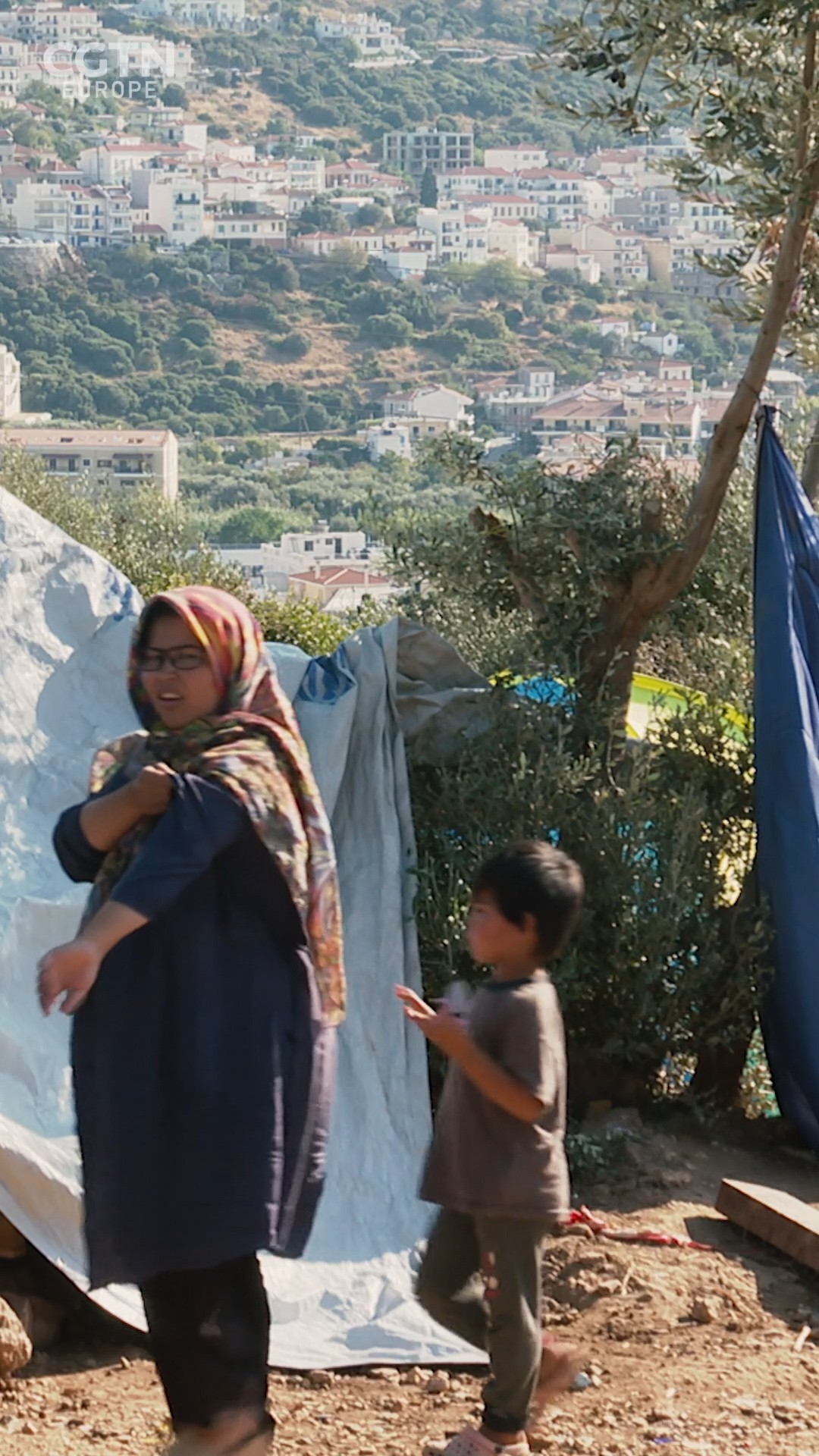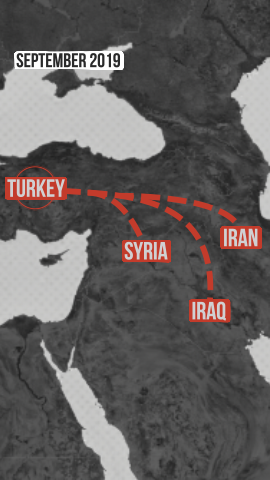07:08

In Samos, more than 5,000 refugees are living in a camp designed to hold just 648 people. Most live in a jungle camp outside the official area. "These people come for a safer future and life," says Despina Anagnostou, senior external relations assistant for UNHCR in Samos. "However, they are stuck for months in situations that are certainly not conducive to any sort of integration, but also they are not dignified.

The official refugee camp on the island of Samos (Credit: CGTN)
The official refugee camp on the island of Samos (Credit: CGTN)
Three years after the EU-Turkey deal, thousands of refugees are trapped in degrading and inhumane conditions across Greece. In 2016, the agreement committed Turkey to accepting the return of all asylum seekers who had passed through the country on their way to the Greek islands. To facilitate this deal, Greece has contained all new arrivals in "island hot spots" while they go through the asylum process. In reality, a slow asylum system and a steady flow of new arrivals have led to severe overcrowding, with refugees forced to wait for many months in unsafe, unsanitary and degrading conditions.

The jungle camp in Samos is unsanitory (Credit: CGTN)
The jungle camp in Samos is unsanitory (Credit: CGTN)
Refugees who have fled war and conflict are shocked by what they find. "The conditions are terrible here," says Azadasher, who arrived last month after fleeing from Syria with his family. "It is uninhabitable, there are rats all around. They gave us this tent but last night it rained. The services are terrible." However, the inhumane conditions do not stop people from arriving and persistent war and conflict in surrounding areas has made September a record month for arrivals in 2019.
00:13

EU law specifies refugees should register as vulnerable or apply for reunification within three months, but many claims get lost in a system that is overwhelmed. "The medical services and psychosocial services are severely understaffed," says Anagnostou. "Essentially there is one doctor at present able to conduct vulnerability assessments."
One of the greatest challenges for refugees in the camps is ethnic in-fighting. On 14 October, the infighting between Arab and Afghan groups resulted in stabbings, serious injury and a fire that burned a large portion of the jungle camp. Pasha Rafiei was a champion sportsman in his home country of Iran but was forced to flee when local officials threatened his life. He is a Muslim but his wife is a Christian – and this is causing problems with their neighbors in the camp.

Pasha Rafiei and his wife Sasha were forced to flee the Samos camp (Credit: CGTN)
Pasha Rafiei and his wife Sasha were forced to flee the Samos camp (Credit: CGTN)
"We had a fight and after that they said 'we will kill you,' so my wife is so afraid," says Rafiei. "After that day, we always go down [to the town] and get back around midnight." They are desperate to move on, but their case is one of thousands of other cases. They are not a priority."
Rafiei adds: "Our first interview is in 2021, but it's just that we are in 2019."
Most refugees believe salvation lies on the mainland, but many will arrive to find conditions for them are little better. There is an acute shortage of accommodation on the mainland. In Athens, most refugees are left to fend for themselves, leaving thousands of men, women and children sleeping on the streets. Praksis works with the UNHCR to offer accommodation and services to homeless refugees, but the help is very limited. Dina Vardaramatou, chair of the board of Praksis, says the people it can help are just the tip of the iceberg.

The aftermath of the fire at the jungle camp (Credit: Pasha Rafiei)
The aftermath of the fire at the jungle camp (Credit: Pasha Rafiei)
"Vulnerable people are people who are, for instance, pregnant women, women who have just given birth, people with chronic diseases, single-parent families, families with many children, but every single case is one of these cases," says Vardaramatou.

Refugees arriving in Athens from the island camps (Credit: AP)
Refugees arriving in Athens from the island camps (Credit: AP)
Even those deemed vulnerable enough to secure accommodation know the respite is temporary. Once asylum is granted, refugees are expected to find a job and support themselves.
Sasha fled from Iraq and is a single mother with two small children. After hearing her positive asylum decision, her social worker tells her: "Now you have three to six months to leave the apartment because you are not any more covered by the organization, we can no longer support you." Sasha doesn't hold out much hope for supporting her family as she speaks no Greek and would have to pay for childcare and there are not many people giving jobs to refugees.
Many of Athens' refugees live in the squares, in the parks and on the streets alongside the many Greek homeless left behind by the economic crisis which hit the country in 2010. Seeing little response from the state, many refugees have occupied the buildings left empty after the economic crisis. The squats offer a viable alternative to homelessness, camps and detention centers, in which conditions are unsafe, unsanitary and undignified.

Refugees are evicted from a squat in Athens (Credit: AFP)
Refugees are evicted from a squat in Athens (Credit: AFP)
This provided respite for a while, but recently there has been a spike in squat evictions. The continuing rise in refugee numbers as people are transferred off the islands is visible across Greece as is the marked deterioration in attitudes towards the plight of refugees.
The recent election of the New Democracy government has resulted in the dissolving of the Ministry of Migration and a merging with the Ministry of Citizens Protection. This worries Ella Dodd, who has been working as a refugee case worker in Athens. "This essentially means that the refugee and asylum-seeking population is now being treated under the umbrella of criminals and delinquents, rather than under any concept of humanitarianism," Dodd says.
She has experienced the rise in tensions between police and refugees first hand. "There has also been a new wave of evictions of self-organized squats in the area of Exarcheia, where many families and children live because they had nowhere else to go, because they had no option to be housed anywhere else, either through the government or through the UN," she says.
Vardaramatou, of Praksis, is also concerned about the change of attitude towards refugees in Greece. "Instead of being inclusive and using the potential skills of people, we are treating them as a problem. I am very concerned about the new commission, because it's rather conservative and it focuses on issues to do with protection instead of inclusion," she says.
Trapped in destitution and unable to move on to other EU countries, for most refugees the European dream has become a living nightmare. Sasha is surprised by her experience in Europe: "Refugees, when they come to Greece, they think they will come to Europe to make a better life – we will have a job, we will have a safe life. We will build our lives how we want, but it's not true," she says.